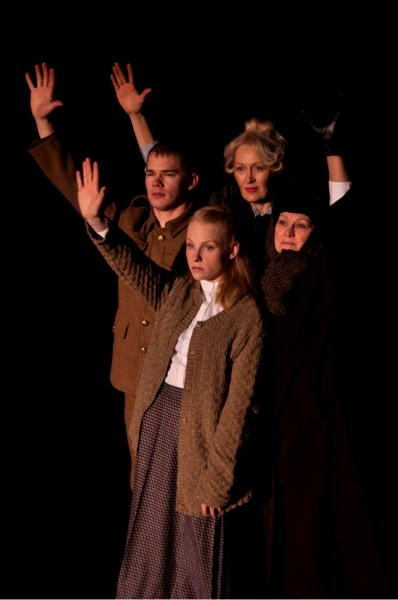Like its painful volatile title, Shatter unfolds close to the heart, splintering it into a million pieces as it follows the prejudiced upshot of the 1917 Halifax explosion.
In this juicy, turn-of-the century historical play, playwright Trina Davis digs into a wealth of material from that fateful day when two war ships in the harbour collided, blew up and levelled an entire city. The detonation created a massive tidal wave and nearly 2,000 people were killed, 9,000 injured and 25,000 left homeless. Describing the horror, the 17-year-old character of Anna says, “There were people with no limbs, limbs without people.”
No wonder co-directors Kristi Gunther-Hansen and former St. Albert Children’s Theatre (SACT) actress Vanessa Sabourin were intrigued by the script’s heart-wrenching treatment of the aftermath. Shatter is now playing at Catalyst Theatre until Saturday, March 19 courtesy of The Maggie Tree.
One December day in Halifax, the jostling city is in the throes of an economic boom spawned by the First World War. Children scurry to school. Women fill shifts in factories and beardless young soldiers board troop ships bound for Europe.
The day after this random explosion, people stagger through the nightmare digging loved ones out of buried buildings or rifling through makeshift morgues hunting for bodies. No one is left unscathed.
Somebody had to be responsible. Even though there was no proof, fingers point to inhabitants of German descent. Canada was in a war with Germany. Who else could be responsible?
Newspapers further inflame public appetite by printing outright lies as witnessed by a screen above the stage that flashes original headlines and newspaper accounts.
It is an emotional storm with no calm weather in sight as the play’s four characters battle an undertow of desperation that has struck hard. But ultimately it is the group prejudice rearing its ugly head that tears apart a family and a community.
At the onset, the play kicks off with an explosion and then flashes back prior to the destruction. We meet Anna (Shannon Blanchet), the teenage lynchpin connecting everyone, a dreamer fuelled by romance with soldiers.
Her mother Jenny (Linda Grass), is a dignified, outspoken widow of the war and is opposed to sending her son to the trenches. Jenny often shares a pot of tea and a good gab with her German best friend Elsie (Sandra Nicholls), a childless widow who works in a factory and takes in boarders to supplement a meagre income. And then there is Brian (Cole Humeny), a young soldier who wants revenge on Germans after they killed his brother on the battlefield.
During the explosion Jenny loses her sight and is left in a nightmarish pit of darkness. Frustrated with her inability to see, Jenny badgers Anna into searching for her son. Displaying a steely spine, Anna wanders through the city gazing at bodies searching for her brother. During her explorations, she meets Brian, who gives her rations and uses his influence to find her shelter in a boxcar.
Several days later, Elsie finds them. Bit by bit, at Brian’s instigations and insinuations, the daughter and mother turn against Elsie. As their friendships fragment — Anna even joins a hungry mob that destroys Elsie’s house — we sadly see each character self immolate.
While Gunther-Hansen and Sabourin keep the rhythmic ebb and flow of tension quite taut, it’s the four actors that turn this two-hour production into a living, breathing gem.
Anna is an exuberant personality forced to grow up too quickly. And Blanchet shows us a character with many faces; curious little girl; feisty daughter, charming friend, hopeless romantic and frightening foe.
In Grass’ Jenny, we see a strong, confident woman slowly self-destruct after the death of her son. As the family matriarch, she veers from being a compassionate but firm woman to a screaming harridan riddled with anger, suspicion, depression and general fatigue from life.
Best of all is the beautifully calibrated performance of Sandra Nicholls’ Elsie, a loving, endearing woman whose stubbornness and mania for privacy becomes her undoing. Nicholls plays her character with a slight, but unwavering Teutonic accent and throughout every scene displays a remarkable naturalness.
Although Brian initially comes across as a prig using his status to justify his actions, Humeny injects the right note of humanity in his character. When he confidentially tells Anna his fear of going overseas, we see him as a vulnerable individual, not just a hardened racist.
And Marissa Kochanski’s (resident St. Albert Children’s Theatre set designer) design talents are a brilliant display of innovation on a low-budget show. The set, primarily loose household props and skilfully placed boards, create a flexible, multi-purpose ambience where life has fallen apart.
If 9/11 has taught us anything, it’s that group racism is self-defeating. In the search for truth, Shatter provokes us into realizing that it is all too easy to repeat our mistakes.
Review
Shatter
The Maggie Tree
Running until Saturday, March 19
Catalyst Theatre
8529 Gateway Blvd.




